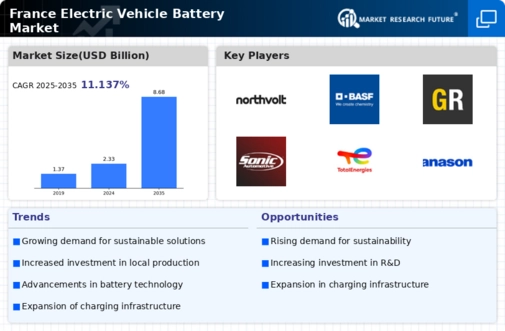Expansion of Charging Infrastructure
The development of a robust charging infrastructure is crucial for the growth of the electric vehicles-battery market in France. As of November 2025, the country has seen a substantial increase in the number of public charging stations, with over 50,000 units installed nationwide. This expansion is essential to alleviate range anxiety among potential electric vehicle users and to encourage broader adoption. The French government has allocated approximately €300 million to enhance charging networks, which is expected to facilitate the transition to electric mobility. Consequently, the availability of charging stations is likely to influence consumer decisions, thereby driving the demand for electric vehicles and their corresponding battery systems.
Investment in Research and Development
Investment in research and development (R&D) is a key driver for the electric vehicles-battery market in France. The government and private sector are increasingly funding R&D initiatives aimed at improving battery efficiency, longevity, and cost-effectiveness. As of November 2025, it is estimated that R&D spending in this sector has reached approximately €1 billion annually. This investment is likely to yield breakthroughs in battery technology, such as solid-state batteries, which promise higher energy densities and faster charging times. The continuous innovation resulting from these efforts is expected to enhance the competitiveness of the electric vehicles-battery market, making electric vehicles more attractive to consumers and businesses alike.
Corporate Fleet Electrification Initiatives
Many corporations in France are increasingly adopting electric vehicles as part of their sustainability strategies, significantly impacting the electric vehicles-battery market. Companies are recognizing the potential cost savings associated with electric fleets, particularly in terms of fuel and maintenance expenses. Reports suggest that corporate fleets could reduce operational costs by up to 30% when transitioning to electric vehicles. This trend is further supported by government incentives aimed at businesses that invest in electric mobility. As more companies commit to electrifying their fleets, the demand for advanced battery technologies is expected to rise, thereby stimulating growth in the electric vehicles-battery market.
Rising Consumer Demand for Electric Vehicles
The electric vehicles-battery market in France is experiencing a notable surge in consumer demand, driven by increasing environmental awareness and the desire for sustainable transportation solutions. Recent surveys indicate that approximately 60% of French consumers express a preference for electric vehicles, reflecting a shift in purchasing behavior. This growing inclination is further supported by the French government's commitment to reducing carbon emissions, aiming for a 40% reduction by 2030. As a result, manufacturers are compelled to enhance their battery technologies to meet this rising demand, thereby propelling the electric vehicles-battery market forward. The interplay between consumer preferences and regulatory frameworks is likely to shape the market landscape significantly in the coming years.
Advancements in Battery Recycling Technologies
The electric vehicles-battery market in France is also influenced by advancements in battery recycling technologies. As the number of electric vehicles on the road increases, so does the need for effective recycling solutions to manage end-of-life batteries. Innovative recycling methods are being developed that can recover up to 95% of valuable materials from used batteries, which is crucial for sustainability. The French government is actively promoting these technologies, recognizing their potential to reduce waste and lower the environmental impact of battery production. This focus on recycling not only supports the electric vehicles-battery market but also aligns with broader environmental goals, potentially enhancing the market's appeal to eco-conscious consumers.
















